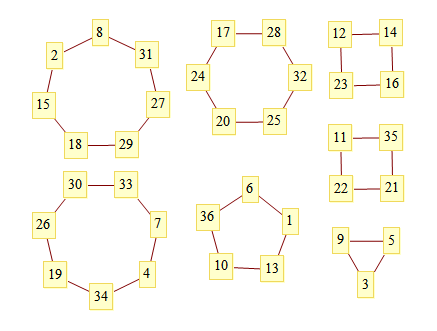I have a list of pairs, for example:
pairs={{13, 10}, {12, 14}, {10, 36}, {35, 11}, {3, 5}, {1, 6},
{20, 24}, {21, 22}, {33, 7}, {31, 8}, {31, 27}, {32, 25},
{21, 35}, {34, 19}, {18, 15}, {14, 16}, {9, 5}, {4, 7},
{1, 13}, {15, 2}, {6, 36}, {4, 34}, {8, 2}, {9, 3}, {25, 20},
{19, 26}, {22, 11}, {23, 12}, {32, 28}, {30, 33}, {23, 16},
{24, 17}, {29, 27}, {26, 30}, {17, 28}, {18, 29}};
pairs can be seen as the definition of a relation $R$. $x$ and $y$ satisfy the relation if and only if {x,y} $\in$ pairs. I need to compute the equivalence classes of the symmetric transitive closure of $R$.
In other words, I need to compute a list eqvclss. The elements of eqvclss are lists themselves. For example, 13, 10, 36, 6, 1, ... should all be in the same list in eqvclss. (If you understand that, then I explained the question properly; if you don't, say so in the comments so I can try to improve).


{13,10}and{10, 36}, you conclude that10and13belong together. But13also belongs with1because{1, 13}exists. However, there is no pair{1, 10}or{10, 1}, so1shouldn't be in the same group as10, which is in the same group as13which belongs with1. So the problem forGatheris that your identity relation is not transitive. As a result, you have to give up some conditions. Maybe you want all gathered groups to be numbers that are at least indirectly connected? $\endgroup$